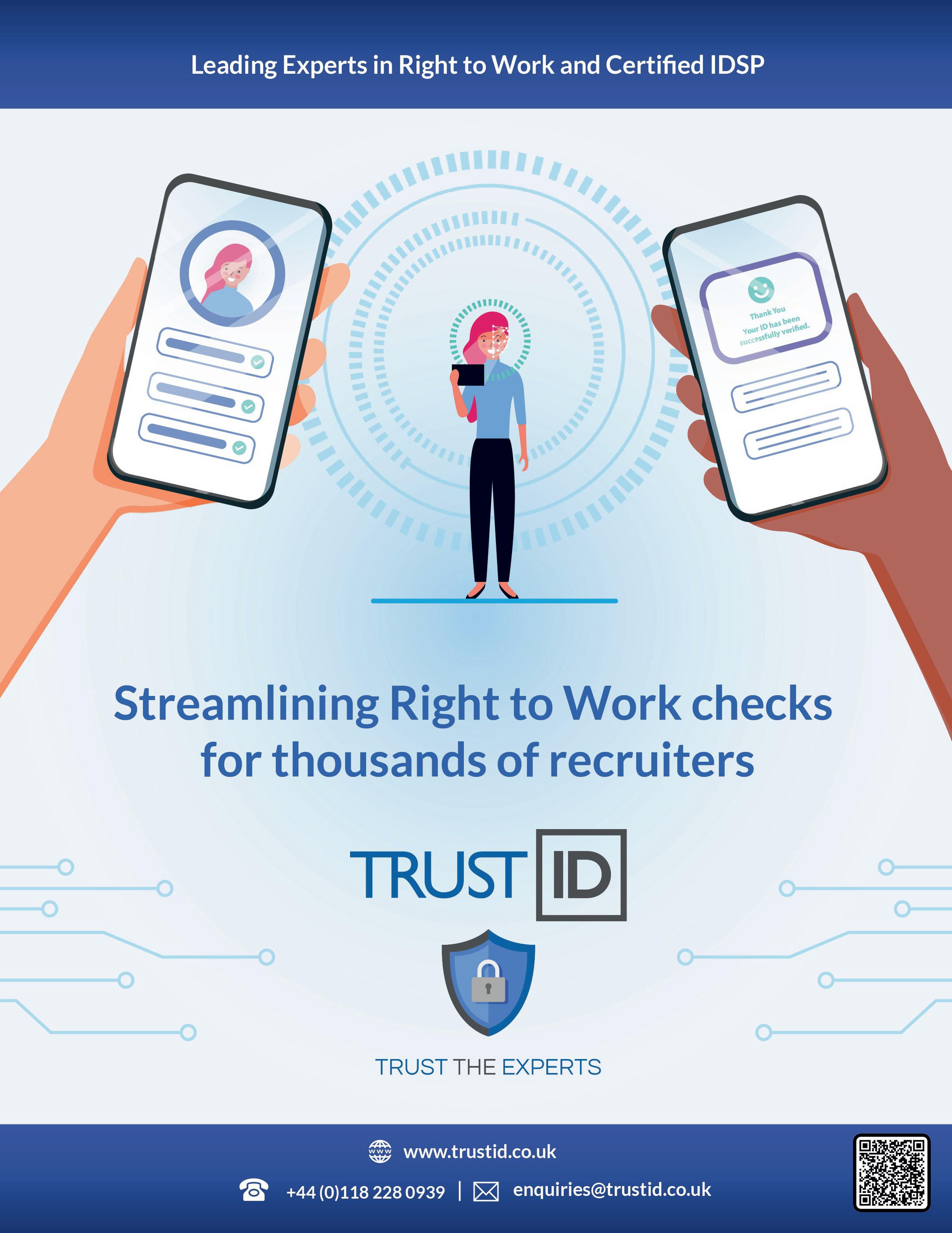DIGITAL IDENTITY






A health check of the system since October



TOXIC POSITIVITY























When optimism at work masks staff concerns


























SPORT























Imogen Baird of Perrett
Laver leads the way to diversify sport’s board membership


GETTING DIVERSE TALENT IN THE BOARD GAME

INCORPORATING Recruitment Matters Business intelligence for recruitment and resourcing professionals www.recruiter.co.uk INCOR Recr M Business for recruitment and Mar/Apr 2023 ww w. re cr ui te r. co .u k
hero
+


































COVER IMAGE PAUL STUART
RWWW.RECRUITER.CO.UK 3 28 E COMMUNITY 28 Social 29 My Brilliant Recruitment Career: Nel Woolcott 32 Movers & Shakers 33 Recruiter contacts 34 The Last Word: Martin Hartley INCORPORATING Recruitment Matters 34 24 18 16 C INTERACTION 16 Viewpoint Heather Salway, director, Jump Advisory 17 Soundbites D FEATURES 18 THE BIG STORY: Digital ID verification checks Remote right-to-work checks are here to stay. But how is the system working out so far? 24 COVER FEATURE: Diversity on board Imogen Baird of headhunter Perrett Laver is working in partnership with Sport England to find more diverse leadership for sporting organisations A NEWS 05 More work to be done on right-to-work checks The REC says there is still more work to be done on digital ID technology 06 UK recruitment sales set to grow in 2O23 Recruitment leaders are forecasting growth, especially in Wales 07 Warning on compliance for migrant workers HR teams must be more vigilant with paperwork 08 Ex-Apprentice’s plans Shazia Hussain aims to use champion neurodiversity 08 Insolvency highs Company insolvencies have increased and are at the highest since 2OO9 09 Contracts & Deals B TRENDS 10 Workplace Remote online bullying and adjusting to onscreen meetings 12 Insight Toxic positivity problems 14 Tech & Tools The latest recruitment technology and services





































We know: A breaking-in period occurs when any new technology or processes are implemented. And in spite of the great advantages of the welcome the UK government has now afforded to digital technology around identity verification and Right to Work, that ‘early days’ tension is clearly underway. (These ‘early days’ can last a long time…)

Our March-April issue takes on the digital tech for RTW world with technology writer Sue Weekes exploring the ins and outs of the discussion in the feature on p18. The Recruitment & Employment Confederation is also taking on the Home Office in requesting greater support for recruiters who are trying to figure the whole thing out. We hope you’ll feel better informed after reading our coverage. But there will no doubt be more information to come later this year.
It’s a real treat to introduce you to Imogen Baird, shining star in the headhunting space, who with her team at Perrett Laver and partnership with Sport England and UK Sport are making that necessary difference in diversifying sport’s collective boardroom. This story is about how it’s happening and their results so far. You’ll be inspired and motivated.
Spring – come and get us!
More work to be done on RTW checks
BY DEEDEE DOKE
DIGITAL IDENTITY DOCUMENT validation technology and processes to verify an individual’s right to work in the UK are “neither low enough cost nor simple enough” to benefit all employers or recruiters, REC CEO Neil Carberry has opined in a winter webinar.









Permitted in the UK since last April [2022], digital RTW checks systems were agreed to by the Home Office for employers carrying out digital checks on British and Irish citizens holding a valid passport, following the wide implementation of such technology and verification methods during the global pandemic.





With the implementation date deferred several times, the government said it ensured that employers had “sufficient time to develop commercial relationships with identity service providers [IDSPs], make the necessary changes to their pre-employment checking processes and carry out responsible on-boarding of their chosen provider”.




 DeeDee Doke, Editor
DeeDee Doke, Editor



However, Carberry told the audience: “There’s a lot still to




NEWS UPDATE WELCOME
Leader
WWW.RECRUITER.CO.UK 5
“It’s a real treat to introduce you to Imogen Baird, a shining star with her team at Perrett Laver”
do to get this right, and we haven’t taken our eyes off it.”
The Home Office has recommended that employers “use a certified provider”, but according to REC campaigns adviser Patrick Milnes, it has “made no mention of intention to make certification a requirement for providers”.
At the same time, the Home Office said: “The responsibility for the check remains with the employer, and they must ensure the IDSP they select to complete the identity verification element of the check carries out a prescribed check prior to the commencement of employment.”
Milnes went on to say: “This gives uncertified providers a licence to operate, and leaves employers exposed to potentially unscrupulous businesses who claim to carry out checks but may not provide the required level of service.”
Even the economy is affected by the challenges around the checks, Carberry went on to say, as they contribute to barriers for UK and Irish workers in finding work quickly.
In his opinion, “the Home Office is the one department where it seems not to care about economic growth”.
For more on digital ID checks, see also The Big Story on p18.
What, if any, difficulties have you experienced when using the new Right to Work (RTW) digital system?
Additional costs of IDSPs*
Variation in standards/services offered by IDSPs
Disparity between UK and overseas nationals
Stricter rules, eg not using expired passports for IDVT** checks
No real difficulties
Something else
Source: REC webinar poll, 8 Dec 2022. Participants could tick as many boxes as were applicable.
*IDSP: Identity Service Provider
**IDVT: Identity Document Verification
Recruitment sales set to grow in 2023
BY DEEDEE DOKE
RECRUITMENT LEADERS ACROSS the UK are forecasting sales growth in 2023, with agencies based in Wales expecting the highest growth, according to a report from Firefish Software.

At 70%, agencies in London are forecasting the slowest growth in 2023, compared to Wales’s 83%, said the Firefish research in ‘The Future of
the Recruitment Industry Report 2023’. However, of all the UK regions, Wales’s recruitment leaders are more cautious about the year ahead generally, with 67% of Welsh respondents neither optimistic nor pessimistic about 2023. In comparison, more than 75% of agency leaders in the North of England are optimistic about the year ahead.
“From the data, it’s evident… that overall, confidence remains positive
55% 27% 41% 41% 14% 6% NEWS UPDATE 6 RECRUITER MAR/APR 2023
AS OF 22 FEB 2023
39,427 FOLLOWERS
throughout the industry; however… confidence levels have retracted with a 14% change in the number of agency leaders reporting a ‘very optimistic’ position heading into 2023 vs 2022,” the Firefish narrative said.
In addition to a doubling of respondents who took a neutral position about what would happen in the coming year, the mood had changed from last year in other ways, with a small percentage of other respondents having a pessimistic position, “a view that no agency leaders reported last year”, the narrative said.
When asked how they expected their sales to change in 2023, compared with 2022, most respondents said that they predicted an increase of 1-25% in the next year. However, 8% of agency leaders said they anticipated more than a 50% sales increase. Taking a contrary view were more than 10% of respondents who expected to see their sales decrease in 2023, the report said.
In terms of headcount, over 60% of agencies plan to increase the number of recruiters in their businesses in 2023, with only 1% expecting a drop in the total number of recruiters working at their agency. More than a third of agencies do not plan on making any changes to their total headcount.
The survey was completed by a total of 194 recruitment agency owners, with technology the sector with greatest representation at 24%. The second largest representation came from the engineering, manufacturing & logistics sector, with 15%.
For the full report, visit www.firefishsoftware.com
HR teams must check migrant workers’ paperwork amid government crackdown
BY DEEDEE DOKE
ORGANISATIONS THAT RECRUIT and employ migrant workers are warned to check paperwork and compliance measures amid a government crackdown on illegal workers, immigration specialists say.
The number of enforcement visits to firms rose by 10% through December 2022 and January this year following Prime Minister Rishi Sunak’s stated intent to reduce illegal migration. During the same period there were 362 arrests of people suspected of being illegal immigrants. Over 90 illegal working civil penalties were issued with fines totalling £1.5m.
The hard-line approach means any organisation that employs overseas workers should carefully review its procedures to ensure it follows the rules, according to Yash Dubal of A Y & J Solicitors.
“It is worrying times for anyone who is not following the rules, whether wittingly or unwittingly,” he said. “The Home Office is intent on making sure only properly documented migrant workers are employed in Britain and those who are not following the rules can expect to be penalised.”
Dubal advises HR teams to check paperwork is up to date.
“In the current climate even those with valid sponsor licences should double check to make sure that they are meeting all their requirements. UKVI [UK Visas and Immigration] conducts regular compliance visits to licence holders and the latest data suggests these are increasing.
“Information must be readily available for inspection by officials. It is also the responsibility of the sponsor licence holder to monitor the compliance of their sponsored employees, including ensuring they are working in accordance with the terms of their visa and that their contact details are up-to-date.”
A Y & J Solicitors has also identified a trend developing in some compliance visits whereby officers have been asking about workplace pension schemes and have been asked to provide records to prove employees have opted out of the company pension scheme.
“This is unlikely to be a problem for larger companies with generally robust HR procedures but may be an issue for smaller employers,” said Dubal. “Companies that do not have a workplace pension scheme, such as sole traders who have newly registered for a licence, might struggle with this line of questioning.”

NEWS UPDATE WWW.RECRUITER.CO.UK 7 IMAGES ISTOCK/SHUTTERSTOCK
Ex-Apprentice candidate Hussain to champion neurodiversity in business
BY VANESSA TOWNSEND
Recruiters were sad to see one of their own – tech recruiter Shazia Hussain – fired by Lord Sugar after landing in the bottom three on The Apprentice.

Recruiter caught up with the departing candidate – who went on the BBC reality TV show to champion neurodiversity – to find out about her plans now she has left the process.
Her business plan was to produce a fusion of luxury, high-quality British-Asian desserts under the name Gourmet Mithai. “I’ve fused the best of British and Indian recipes to create a unique, healthy and tasty product in the dessert industry,” she said. “We are currently selling them for corporate and hospitality events. I want Gourmet Mithai to be in Fortnum & Mason, Harrods and major retailers.”
Being diagnosed with ADHD [attention deficit hyperactivity disorder], dyslexia and dyspraxia, Hussain now wants to champion neurodiversity in business, and “to enable children that have come from backgrounds similar to mine to maximise their potential”.
“It [neurodiversity] is a strength!” she told Recruiter “Moving forward I want to champion neurodiversity in business and in the corporate sector. It’s an advantage and makes us stand out from the crowd. Being able to navigate that neurodiversity is something that
I’m learning only now and it’s nothing to feel ashamed or embarrassed about.”
Her neurodiversity wasn’t picked up on when she was younger, she said, because she came from an underprivileged area in Yorkshire. “My parents didn’t have the insight into neurodiversity or the money to get me diagnosed. I really want to shine a light on how expensive the diagnosis is to get and that children especially from underprivileged backgrounds often go undiagnosed and unsupported because of the sheer cost. Every child deserves the right to the correct start and support in life.”
Asked whether the recruitment sector needs to improve how it recruits neurodiverse candidates, Hussain, the ex-Accenture, JP Morgan recruiter, said: “I’m fortunate because I work in tech recruitment and we are always leading the way on diversity & inclusion programmes… However, more needs to be done.”
Company insolvencies at highest since 2009
The number of companies in financial despair has increased over the last year, according to government insolvency figures for 2022.
In 2022, company insolvencies were at 22,109 – the highest since 2009 – and 57% higher than the previous year.
The number of company voluntary liquidations (CVLs) in 2022 was the highest annual number in the time series since records began in 1960. CVLs make up the largest percentage of company insolvencies. In 2022, CVLs increased by 49% in 2021 to the highest annual number since the start of the time series in 1960. They accounted for 85% of all insolvencies.
The other types of all company insolvencies were compulsory liquidations (9%), administrations (6%) and CV arrangements (1%).
Among the industries with the highest number of insolvencies in 2022 were construction, retail trade, and accommodation and food service.
Oliver Collinge from insolvency practitioners PKF GM said the rise in insolvency numbers “is not surprising” due to the cost-of-living crisis in the UK. “Many distressed businesses managed to keep afloat through Covid by using the high level of government support available,” he said.
Quarterly insolvency statistics for October to December (Q4) 2022 show that there were 5,995 company insolvencies registered in Q4 2022, which was the highest total since Q4 2008.
Collinge said the current headwinds will rock even some better-performing businesses in 2023, not only those “in survival mode”.
He also said the IMF predicts that the UK will be the “worst performing big economy in 2023” and that we should expect “heightened levels of business failures” for some time to come.
“It’s critical businesses act early if they are struggling now or think cashflow may be squeezed in the coming months,” Collinge said. “The earlier they act, the more options they’ll have to secure the business’s long-term survival.”
NEWS UPDATE 8 RECRUITER MAR/APR 2023
IMAGE | BBC PICTURES
CONTRACTS & DEALS
House of HR
House of HR is to acquire German healthcare staffing company pluss, which is expected to be completed in Q1 2023. The acquisition would be House of HR’s third in the German healthcare staffing solutions area, after its acquisitions of avanti in 2021 and LD Personalvermittlung in 2022. Founded in 1984, pluss specialises in recruitment for healthcare and social services on a temporary basis, providing nurses, social pedagogues, educators, physicians and anaesthesiologists.

Heidrick & Struggles
Global executive search firm Heidrick & Struggles has acquired executive interim management firm Atreus in Germany. Terms of the transaction were not disclosed.


Gravitas Recruitment Group

UK-headquartered global recruitment company Gravitas Recruitment Group has acquired both of Hamlyn Williams’ Asian operations, located in Hong Kong and Shenzhen. This acquisition is part of Gravitas’s growth and expansion plans, as it continues to strengthen its presence in the Asia markets.
Circle Health Group Circle Health Group (CHG) has partnered with Retinue Solutions to provide a neutral vendor agency solution. Retinue Solutions will manage CHG’s entire agency contingent workforce through a curated and managed supply chain using Retinue-Bridge, Retinue’s proprietary vendor management system (VMS).


DEAL OF THE MONTH
Kingsley Gate Partners

Executive search firm Kingsley Gate Partners has increased its international presence by adding The Omerta Group, a search firm specialising in financial services, to its operations.
Headquartered in London, The Omerta Group has a longstanding presence and a strong reputation in global financial services. Kingsley Gate is tech-enabled, global and backed by private equity firm Crescent Cove Advisors.
The Omerta Group will complement Kingsley Gate Partners’ strength in the US and will accelerate the firm’s growing footprint across the UK, continental Europe, the Middle East and Asia/Pacific.
Jason Mort, founder and CEO of The Omerta Group, will serve as leader of Kingsley Gate’s Global Financial Services Practice and has also been appointed to the firm’s Global Leadership Team.
Maxwell Bond
Maxwell Bond has announced a 12-month talent partnership with Trafford City Council. The tech recruitment firm will manage the council’s tech and digital recruitment in Manchester to help scale and grow to deliver projects while providing new opportunities to the local community.

NES Fircroft
NES Fircroft has acquired scientific and technical recruitment firm Evolve Scientific Recruitment in Australia. NES Fircroft provides a range of contract and permanent talent solutions to the life sciences, power, renewables, oil & gas, infrastructure, chemicals and mining sectors worldwide. The acquisition of Evolve, with its local scientific and technical recruitment expertise will strengthen NES Fircroft’s position for both scientific and technical employment solutions across APAC, according to a company statement.
RAMP Global
RAMP Global, the London-headquartered global talent acquisition platform, has announced $1m (£830k) in new funding as it scales its software development and product capabilities. The private funding round has enabled RAMP Global to substantially grow its European software development team, growing it eightfold in the last year, and to open a new office in Poprad, Slovakia.

Tribepad
Talent acquisition software provider Tribepad has secured a £12m investment from growth capital investors BGF. According to a company statement, with BGF’s investment, Tribepad will be able to scale its offering, as well as develop new features and functionality that is aimed at improving the overall user experience.

NEWS CONTRACTS WWW.RECRUITER.CO.UK 9
More contract news at recruiter.co.uk/news
Online bullying in the workplace
Workplace bullying goes well beyond the office walls and into the remote work realm. What’s worse, workplace bullying has been on the rise since the pandemic – a 13% increase, in fact, compared to pre-pandemic numbers, according to Soprana Personnel International. The practice also accounts for a reported 23% of resignations in the US, expanding the skills gap in the labour market.
Overloading colleagues with work, undermining others’ opinions, excluding team members from virtual communication or projecting hostile
behaviour in a cyber setting are some of the warning signs of online bullying for remote teams.
Remote bullying is one of the driving factors in toxic workplace behaviour. In contrast to real-time workplace bullying – which might manifest in more recognisable patterns like the assertion of power, practices such as intimidation, intruding on colleagues’ privacy, making offensive remarks or belittling others’ opinions, for instance – remote bullying might be a more delicate issue.
“One of the crucial aspects of remote bullying is that everyone in the team can be an online bully; it is not limited to higher-ranking colleagues. That is
why organisations should create processes that would help everyone in the team – both the potential bully and the victim – to identify certain toxic behaviours in professional setting,” said Diana Blažaitienė, remote work expert and founder of Soprana, a recruitment and temporary hire solutions agency.
“The signs of remote bullying are not always clean-cut and can gradually worsen up to a point when a remote worker feels their work motivation and efficiency are significantly impaired. Setting up boundaries is one of the most essential moments in breaking off remote bullying behaviours,” Blažaitienė added.
For employers, she suggests establishing clear policies on remote work practices and expectations for employees to prevent unwarranted behaviour. Promoting honest and open conversations within the remote teams and implementing regular virtual check-ins also allows staff to nurture trust in the employer. Encouraging remote staff to report any cases of virtual bullying and together navigating how to best respond in such cases assures the employee that the employer has their back.
“Besides more strict measures like creating anti-bullying guidelines and procedures, team leaders can take more interpersonal approaches like team-building activities that prompt deeper connection and understanding between remote staff members,” the remote work expert maintained.
That said, Blažaitienė advises remote managers and workers consider their own workplace behaviour to create a bullying-free environment; always display professional conduct towards other colleagues by communicating and delegating tasks with respect, refraining from gossiping, participating in meetings, exchanging information and resources with all team members, and using professional development and growth opportunities to minimise outbursts of remote bullying. ●
Soprana Personnel International provides Scandinavian and German companies with personnel recruitment and outsourcing services for remote, hybrid and local teams.
TRENDS WORKPLACE 10 RECRUITER MAR/APR 2023
Dealing with remote bullying and adjusting to onscreen meetings are just two new issues faced by businesses
Meeting in the virtual space
meeting. Encourage those who are less outgoing to add a background that invites questions or makes a statement about their interests.
Whatever rituals you propose, lead by example. If you’re not afraid to make yourself vulnerable and you don’t take yourself too seriously, even on the most ‘important’ calls, you’ll be putting your team at ease to do the same.
Reassess your physical environment
Aside from adjusting processes and workplace culture, some shifts can and should be implemented by your individual team members. Encourage them to evaluate the set-up of their work area. Clear away clutter and distractions. Even if they aren’t visible onscreen, they can crowd your mind and contribute to stress. You can also help your employees invest in their own healthy at-home work habits by subsidising materials like standing desks or walking pads.
It’s safe to say video meetings are here to stay, says workplace expert Stephanie Palomino. But platforms continue to be riddled with connectivity and reliability issues. Completely integrated tools that don’t rely on a third party are few and far between, Palomino reminds us, writing in Smart Brief for Leadership.
However, you can make plenty of tweaks to take your video meetings to the next level and make your team feel more at home in the world of virtual meeting spaces. Palomino recommends:
Cut background noise
Sound is often sacrificed for the visual components of a virtual meeting place. It doesn’t have to be that way. Set an example for your team by using Bluetooth or noise-cancelling headphones to eliminate surrounding chatter and encourage focus.
Do your research on resources that might improve the audio quality of your meetings, including an external mic. The hardware you and your team
use can also make a world of difference in your attitude toward work.
Introduce rituals
It takes roughly seven repetitions to drive a message home. It falls to you, as the leader, to find ways of keeping your employees energised, focused and happy. That’s no easy feat when some days feel like eight hours of staring into a webcam.
Get into the habit of keeping meetings short: 15 mins for a stand-up call, 30 mins for a catch-up and nothing longer than 45 mins. In addition to ensuring the purpose and agenda of each call are set ahead of logging in, allowing yourself less time ensures that you remain on task in your discussions and get to the points that matter.
On the calls themselves, the tone that you set can make or break the experience for everyone involved. Whatever personality you bring to real-life meetings is doubly needed in virtual ones. Some team members might be naturally inclined to wear funny things or crack jokes during a
And don’t neglect your physical relationship to your workspace. Posture is an enormously important yet under-observed factor in physical performance. To keep your team’s spines in check, resist booking video meetings back-to-back and take breaks for quick reset exercises.
Embrace the growing pains
Learn to appreciate that there is an art to holding a video meeting. Organising new habits for your team means continuous trial and error. Operating in a remote workplace demands more organisation, advance planning, creativity and collaboration than ever before. As you implement the practices that you feel are right for your team, be receptive to their feedback – a screen can’t hide facial expressions. An open dialogue will increase the chances of creating video meeting experiences that your team actually looks forward to. ●
Stefanie Palomino is chief product officer and general manager of ROOM3D from The TMRW Foundation. This article is excerpted from ‘Use these 4 strategies to make online meetings bearable’ from Smart Brief on Leadership.
WWW.RECRUITER.CO.UK 11 TRENDS WORKPLACE IMAGES ISTOCK/SHUTTERSTOCK
WHEN OPTIMISM IS TOO MUCH
The toxic positivity problem for work environments
BY CONNOR CAMPBELL
Have you ever felt that your concerns were being dismissed with an overly positive attitude? Perhaps you reported an issue with a co-worker to management only to have them thank you for your hard work? If so, this is an example of a phenomenon known as ‘toxic positivity’, wherein employees’ concerns are inadvertently dismissed by management using misplaced, overly positive phrases that don't offer any real solutions.
As concerns over workplace bullying have grown over the past couple of years, with bullying claims rising by over 44% in the 12 months between March of 2021 and 2022, an increasing number of managers and business leaders are reluctant to contribute to anything that may be viewed as ‘negativity’.
In response, an overuse of positivity has emerged that may leave employees feeling that their concerns are not being taken seriously by senior management.
Employee happiness has become the key to staff retention in recent years. However, there seems to have been a misunderstanding as to what constitutes employee happiness in some cases.
Everything is fine
In an attempt to avoid perceived workplace bullying and gossip, some business leaders have implemented unofficial anti-negativity policies in the workplace, which has led to both management and employees withholding feedback and criticism in fear of being viewed as being negative.
Rather than openly addressing issues, reassurances of ‘everything being fine’ has become common in some workplaces. This ‘toxic positivity’ minimises the concerns being raised and closes the conversation without reaching any form of solution. This trend has seen an increase in overtly positive responses to negative feedback, such as “look on the bright side!” or “think happy thoughts!” Whilst this could be seen as relatively annoying, does ‘toxic positivity’ have the potential to create a truly negative work environment if left unchecked?
Whilst ‘toxic positivity’ mostly stems from good intentions, forced positive responses can lead to staff becoming resentful and feeling that they’re not being listened to. Rather than building employee happiness,
the result may unfortunately become the opposite and even lead to staff leaving the business.
As we all recognise, the workplace can, at times, be stressful. Various factors can cause employees to develop grievances – from impeding deadlines to negative experiences with other staff or clientele. When issues arise, it’s important that employees are provided with a safe and non-judgemental environment in which to raise their concerns with management and work together to find a solution.
TRENDS INSIGHT 12 RECRUITER MAR/APR 2023
Some business leaders have implemented unofficial antinegativity policies in the workplace
Treating issues professionally
Grievances are a serious issue that should be treated professionally.
Whether employees feel their client is becoming difficult to negotiate with, or they are concerned they will be unable to fulfil their workload within the current deadline, management should listen to employees’ concerns and work to rectify the situation. Instead, we have seen an increase in concerns being dismissed as a ‘negative attitude’.
Workplace bullying has become a problem for management in recent years, with claims rising over 44% in the

12 months between March 2021 and March 2022. In response, some firms have moved away from anything that may be branded as ‘negativity’ and could be perceived as discriminatory. Whilst ‘toxic positivity’ isn’t intended to be harmful, it has left employees feeling they are no longer being listened to.
If this continues, businesses could see increasing grievance escalations, and potentially even resignations. When we are working, we want to approach management with any issues we may have and know that they will do their best to help. When we are met
with responses such as, “at least this didn’t happen instead!” it can make us feel unvalued by our employer and may prompt us to look for work elsewhere.
If business leaders feel that ‘toxic positivity’ may be developing in their workplace, they should aim to:
1 Listen to employee concerns
It is important for management to actively listen to employees when they report a concern, and for the employee to be reassured that a solution will be implemented. Rather than telling employees that “everything will be okay”, management should instead opt to thank employees for bringing the issue to their attention and ask them what can be done to help.
2 Be transparent about company issues
‘Toxic positivity’ is not limited to employees attempting to raise concerns with management. Business leaders also sometimes exhibit an overly-positive attitude when addressing business announcements and financial hardships. Instead, business owners should aim to be as transparent and honest with their employees as possible, even when delivering less-than-ideal news.

3 Take action and offer updates
It’s important that, if you are going to listen to the concerns of your employees, you should then be willing to take appropriate action and maintain dialogue to explain what is being done to address any issues raised. If it turns out that action isn’t taken, it’s important to explain the reasons why. ●
Sources: BetterUp, Forbes, LinkedIn and People Management
CONNOR CAMPBELL is principal consultant, LHH UK and Ireland


WWW.RECRUITER.CO.UK 13 TRENDS INSIGHT IMAGE | SHUTTERSTOCK
↗
TECH & TOOLS
IN FOCUS: The rise of the chatbots
BY SUE WEEKES
Those who follow Toby Culshaw, global head of talent intelligence at Worldwide Amazon Stores, on LinkedIn will have been fascinated and amused by his request to Open AI’s chatbot ChatGPT to create two poems on talent intelligence, one even in the style of cartoon character Popeye.
It succeeds on both counts, and the exercise has a serious side in demonstrating the considerable potential of chatbots and digital assistants. Equipped with high-level natural language processing capabilities, their ability to hold an online conversation with a human being means they can be used perform a range of routine tasks, including in recruitment.
Culshaw believes such technology has the potential to provide huge time-savings to talent acquisition, intelligence and
sourcing by automating tasks like CV screening, scheduling interviews, and even provide real-time analytics and reporting, as well as creating standardised, non-creative copy for adverts. He adds: “I can easily foresee this technology given fields in a CRM/ applicant tracking system and used to automatically search for individuals, crafting approach emails and auto-scheduling initial calls for those that reply, for example.”
According to the analyst Gartner, 75% of HR inquiries will be initiated through conversational artificial intelligence (AI) platforms by this year. Indeed, plenty of employers have already adopted their use in day-to-day recruitment and HR operations. iCIMS’ AI-powered chatbot was responsible for setting up more than 45,000 interviews across 200-plus countries and territories
in 2022, supporting candidates in more than 20 languages. It reports that having struggled to find roles that matched their skillset, luxury goods retailer Chalhoub Group has had more than 20,000 applications submitted through the iCIMS Digital Assistant since its integration. Using the chatbot, it takes candidates just 15 seconds to discover open positions on the career site that interest them, eliminating candidate drop-off
“AI-powered recruitment chatbots can serve as always-on talent support with natural language processing to enhance the career site and job search experience,” says Al Smith, chief technology officer at iCIMS. “With iCIMS, talent acquisition teams can supplement text and email campaigns with the digital assistant to continue providing a personalised experience and move talent through the hiring flow.”
TRENDS TECHNOLOGY AND SERVICES
14 RECRUITER MAR/APR 2023
Recruitment process outsourcing provider PeopleScout, a TrueBlue company, carried out a survey entitled ‘Inside the Candidate Experience’ that revealed only around a third of organisations globally had career sites that featured frequently asked questions or advice to support candidates throughout the process. “Deploying a chatbot to answer some of these common questions can help to set realistic expectations for candidates, reduce their anxiety throughout the recruitment process and decrease drop-off,” says Simon Wright, global head of talent advisory consulting at PeopleScout.

He adds that the other common uses of chatbots are in application and screening in high volume recruitment, such as in retail and hospitality workers. “At these stages, a chatbot can capture critical details from the candidate
in a way that’s much more appealing than a standard application form.”
Chatbots also work 24/7, all around the globe. Wright says with PeopleScout clients, half of chatbot sessions occur outside of working hours when recruiters are not available to speak to candidates. “In our ‘always on’ world, chatbots are a valuable tool for candidate engagement,” he adds. “For example, our client The AA doubled its application volumes and saw a 20% improvement in careers site engagement after PeopleScout deployed their chatbot.”
Some people have concerns about engaging with chatbots and, to allay fears, Smith offers key indicators to determine if a provider has developed its AI chatbot in an ethical and conscientious way. “Does the provider have a code of ethics? Does the provider align with the latest ethical AI regulations and industry best practices?” he says. “These questions can help companies understand if the AI and chatbots have been designed responsibly, which can go a long way towards increasing adoption among talent teams and candidates.”
Culshaw believes a chatbot’s limitations lie in creativity and personal connection. “If everyone is using the same tech to scale then how do you ensure the candidate hears you through the noise?” he says. “If adopted at scale I can actually see it being used as an automated first phase that then enables sourcers to go back to far more traditional sourcing traits, networking with candidates, building relationships, more time on the phone, more time face-to-face and more time in conferences building relationships.” ●
IN BRIEF
Cutting through relocation red tape
Localyze has revamped its global talent platform to make it less complex for employees to navigate what it says can be a “challenging and scary immigration” journey. It includes quick access to information, documents, appointment dates and partner offers from a single dashboard as well as a personalised step-bystep journey. Localyzeapp.com
Selfie identification before signing Digital ID company Yoti is integrating ‘selfie’ verification directly into the signing process of its digital ID platform. eSign with Selfie allows individuals to confirm their identity with a selfie before signing a document. After taking the image, Yoti’s proprietary technology, MyFace, confirms they are a real person by undertaking a ‘liveness’ check. The selfie is then cryptographically linked with the individual’s signature.
www.yoti.com

AI takes strain out of writing job ads
Multi-job posting tool WaveTrackR is launching a tool that uses AI to help write job adverts. Recruiters enter the job role essentials and any extra information provided in the brief. It claims the AI Job Advert Assistant will create an advert that works with the job board algorithms in seconds. The advert can then be adjusted by the recruiter, bringing their creativity and flair to the advert. wavetrackr.com
Conversing with AI Employee experience platform
LumApps has bought Vizir, developer of a no-code digital assistant technology, also called predictive chatbot technology. The move will enable it to progress its conversational AI strategy to help recruiters and employers automate routine tasks and improve employee access to information.

www.lumapps.com
Linking under-represented talent
Loop Not Luck is a recently launched job board that aims to connect under-represented candidates with tailored career opportunities. Through a personalised percentage match, candidates can see how closely they are predicted to fit the role.
https://loopnotluck.com/

WWW.RECRUITER.CO.UK 15 TRENDS TECHNOLOGY AND SERVICES IMAGE | ISTOCK
BY HEATHER SALWAY
Data from the Office of National Statistics shows that approximately 1m people in the UK have left work since the start of the pandemic in March 2020, with retirement the most popular reason given by people aged between 50-70.
In a prolonged period of candidate scarcity we must ensure we are accessing talent from as wide a pool as possible, but there’s not much evidence that recruiters are specifically focused on tapping into the rich seam of talent found in older workers.
Lucy Tootell of Temporis Legal Recruitment is a notable exception, with 40% of her locums aged 60-plus. “Our clients are paying a premium for locums so they’re looking for highly experienced candidates and our older locums have plenty of that,” she says.





Of course, older workers are as diverse a group as other workers, but a recent study from the Department of Work and Pensions found that over 75% of businesses agreed that “the experience of workers aged 50 or older was a main benefit of employing them in their organisation, followed by the reliability of workers in this age group and the mentoring older workers provide to new workers”.
There are important features that you and your clients need to understand to attract older workers. One key offer is
flexibility. While older workers are less likely to have young children making calls on their time they’re more likely to have other caring responsibilities like ageing parents. They’re not called the ‘sandwich generation’ for nothing.
The flexibility to choose how to fit work around their other responsibilities will make returning to work more attractive. For the same reason the ability to work remotely for some of the time will also help. Also, there are good examples of older workers who prefer the traditional Monday to Friday in the office at a desk, so choice is the driver here.
A Chartered Management Institute survey of more than 1,000 UK managers found that 42% would be open to hiring people aged between 50-64 to a large extent. That’s plenty of hiring managers for us to work with, but what about the 58% who aren’t so open?
Right now, when their options are limited is a great time for recruiters to make the argument and as talent acquisition experts we have a responsibility to lead the way in this area. Helping clients to focus more on the skills and experience available and less on irrelevant age can really help here.
A recent Deloitte survey showed 40% of Gen Z workers plan to change jobs in the next two years. Older workers can be less interested in climbing the promotion ladder, so stability is definitely a feature. They can be effective mentors for those people at the start of their careers sharing real life experience particularly of managing others.
And what about our industry itself. Whilst many owners/founders would comfortably fit the definition of ‘older’ worker, and many shout about the benefits of diversity, when we recruit trainees it’s almost exclusively young people fresh from university or with one or two years of work experience.
HEATHER SALWAY is director at Jump Advisory



With the shortage of candidates being the main thing that recruiters say is holding them back, and the myriad benefits of a diverse workforce, wouldn’t it make sense to hire some older workers ourselves? ●

C INTERACTION VIEWPOINT 16 RECRUITER MAR/APR 2023
In with the old Having been there and done that – nothing beats experience
IMAGE | SHUTTERSTOCK
WEBCHAT
4-DAY WEEK MAY BE THE NEW NORM
Following a six-month trial, testing the costs and benefits of a four-day week on full pay, around 60 employers were keen to keep the new work pattern.
“With all flexible working, it depends on the individual and industry. One of our clients has shadowed the four-day working week and implemented it in their business. Anyone that was working four days a week got an uplift in pay to balance full-time employees. They had some caveats if staff wanted to trial the four-day week, with one that they had to be in the office and not work from home as they wanted to have more of a team ethos. For some members, the flexibility of working from home outweighed the reduction in the working week. Another member of the team felt that working 32 hours over five days worked better for their worklife balance. Many small business owners often can’t afford to provide too many benefits but the benefit of flexibility costs nothing as long as it works for the employee and employer.”
Kate Underwood
Managing director/HR director at Kate Underwood HR and Training




The four-day week scheme, organised by 4 Day Week Global, took place between June and December 2022, and involved organisations across the UK, including small firms and recruiters.
PAUL RAYNER CEO, OAKSTONE INTERNATIONAL



“The biggest business decision for me as CEO at a mid-sized recruiter/search firm is how to balance growth with cash flow. Although in our case it’s magnified due to the direct link between the number of consultants we have and our delivery volume capability, like most businesses the biggest issue is when to hire. Being able to on-board, train and support people to the point when they can deliver effectively and add to the bottom line is walking a fine line regarding investment in people while ensuring the need for profit, without which we cannot survive.”
MARY ALICE VUICIC
CHIEF
PEOPLE OFFICER, THOMSON REUTERS



“From an HR perspective, the biggest decision that we will make in Q1 is also one of the biggest opportunities: doubling down on growing our people. Internal talent development and mobility will be the most important work we do in 2023. People are putting more pressure on their current employer to help them develop new skills. Companies that offer internal talent development and mobility will have a significant advantage. We’re constantly exploring how to give our team members the best possible training so they can continue on their career paths. How we set our teammates up for continued success is ultimately how we set our business up for success.”
JULIE MOTT
MANAGING
DIRECTOR, HOWETT THORPE
“The Great Resignation continues to threaten employers’ abilities to attract and retain talent. So, the most important decision we will make at the start of 2023 is how to ensure the most effective recruitment strategies for clients. Many people are struggling emotionally and financially right now, so we will encourage businesses to entice applicants with wellbeing programmes, flexible work policies, supportive company culture and salary transparency. To help employers get the best candidates, we will also encourage an holistic approach to candidate selection and the use of advanced, time-saving technologies like artificial intelligence during screening.”
INTERACTION SOUNDBITES WWW.RECRUITER.CO.UK 17
“What’s the biggest business decision you’ll make in the first quarter of 2023?”
The introduction of digital identity verification checks have been in situ since October. Sue Weekes investigates how the system is working to date




















Remote checks are



HERE TO



THE BIG STORY 18 RECRUITER MAR/APR 2023
Just over six months on from the introduction of the Digital Right to Work scheme by the UK government, Keith Rosser, Reed’s director of group risk and the director of Reed Screening, describes the situation as “80% forward” but adds: “It still isn’t what it needs to be.”
Rosser was an ardent campaigner of extending digital identity checks beyond the Covid-19 pandemic, during which they became a necessity, and was quoted alongside ministers in the official launch. Since the government’s decision to go digital, he wants to ensure the system is properly and fairly implemented. Hence, he was among those instrumental in getting the government to delay the ‘go live’ date by six months until October 2022 instead of April to give organisations more time to prepare.
The scheme allows employers to remotely verify the right to work status of a British or Irish employee using an accredited Identity Digital Service Provider (IDSP). In his role on the ECHO Home Office Committee and chair of the Better Hiring Institute, he explains that evidence and data from employers representing around a million workers revealed that, since October, the number of applications per job has fallen because the system isn’t sufficiently inclusive. It also showed that the number of people dropping out of the process midway through had increased.
“These were two very powerful messages,” says Rosser, who added that one of the main challenges is that the



system requires an in-date passport or visa. “Looking at the last two census results, we’ve estimated that about one in five jobseekers won’t have an in-date passport so won’t be able to interact with the digital system. This means the only way they could get a job was either to post the original out-of-date passport, or other document like a birth certificate, or actually meet the employer face-to-face.”
Rosser reports that the government took the feedback on board and is now looking at how the scheme could be expanded and therefore made more inclusive.
“Then, at that point, it is my belief we will have the first phase of a complete digital right-to-work system,” he says.






Rise of the IDSPs






Digital identity checks are completed by the burgeoning IDSP sector. These are commercial companies certified by the Department for Digital Culture and Sport, which is responsible for the UK Digital Identity & Attributes Trust Framework that defines the rules, standards and governance that IDSPs must adhere to. The framework is part of the bigger digital identity strategy being pursued by the government and in short, seeks to define what “good” identity verification looks like.
In theory, IDSPs provide a more efficient, streamlined and secure way of proving identity. However, the platform market is growing quickly and recruiters need to carry out due diligence when choosing who they partner with. As with any bedding-in period, there are issues in areas such as price, integration with existing systems and processes and range of services offered. Potential buyers should quiz accredited providers on these.





Russ Cohn, general manager of OCR Labs Global, says recruiters and employers are enjoying the






THE BIG STORY WWW.RECRUITER.CO.UK 19 IMAGES | SHUTTERSTOCK
convenience of digital and “aren’t reverting back to old ways”.








“Remote is here to stay,” he says, but adds an important caveat: “Despite a requirement that IDSPs be certified to perform right-to-work and right-to-rent checks and DBS checks, not all IDSPs are the same. Identity verification technology used by some IDSPs can be biased, disadvantaging communities of colour. And current IDSP certification does not require IDSPs to prove the underlying identity technology provider ‘passes the test for non-bias algorithms’.”






John Abbott, chief commercial officer of the IDSP Yoti, which has also partnered with the Post Office on its EasyID system, concurs that businesses have welcomed the speed, accuracy and flexibility of the digital checks and says it also
relieves the pressure on recruitment and HR teams to manually check identity, reducing the chance of human error.



“A right-to-work check is necessary for all employees in the UK but many businesses see these checks as a simple box-ticking exercise,” he says. “Employing someone who doesn’t have the legal ability to work can however incur significant financial and reputational costs for a business. If a company is found guilty, it can be fined £20k for each illegal worker.”


Barriers to digital
When built into onboarding processes, Abbott says, digital identity can bring further productivity gains and provides a better experience for the employee. He points to Post Office Hot Topics data that reveals nearly half (46%) of
















people do not feel comfortable with businesses taking a photocopy of their ID. “Furthermore, photocopying a new starter’s ID creates a mountain of sensitive paperwork,” he says. “Digital ID verification strengthens the process by supporting teams with a higher level of security and is much faster for new starters. They just take a photo of the front and back of their ID and then a selfie to verify their identity in real-time, saving valuable onboarding time. It also stops HR and admin teams from handling and storing sensitive information unsafely.”


THE BIG STORY 20 RECRUITER MAR/APR 2023 IMAGES | SHUTTERSTOCK
“If a company is found guilty, it can be fined £20k for each illegal worker”
CASE STUDY BUILDING IN INCLUSIVITY






Reed Screening, specialists in employment screening for over a decade, and part of the global recruitment business Reed, chose OCR Labs Global to support a wider range of employment screening products. OCR Labs Global provided its underlying real-time technology for document verification, fraud detection and biometric matching.
For Reed Screening, digital identity needed to allow for the hiring process to become not just faster, but also fairer and safer. Corrine Peart, head of strategic sales and client relationships at Reed Screening, explains that equitable access was a key requirement in its search for an IDV [identity verification] solution: “Excluding those without the right availability, documents, device or bandwidth would reinforce existing forms of discrimination against migrant or economically disadvantaged workers,” she says.
OCR Labs Global says to establish an inclusive digital identity system, accessibility must be considered throughout the entire development process, not addressed as an afterthought. A genuine effort must also be made to understand the challenges faced by end-users so no customers are left behind.
A central challenge faced by job candidates is the need to complete right-to-work checks. A reliance on human teams to conduct verification restricts the available service hours offered to candidates, while conducting checks in person can be time-consuming and expensive. Manual screening bias disproportionately impacts lowincome individuals and communities of colour.







“Allowing candidates to complete identity checks remotely, at a time that suits them, will support those without the physical or financial means to travel and open up employment opportunities that wouldn’t have been available to them previously,” says Peart.

“Reed has outlined proposals for further changes to the digital rightto-work scheme that will make it even more inclusive and help maximise available talent to hirers, proposals that were accepted by the Minister of State.”

By carefully considering inclusivity in selecting an automated document verification and biometric matching solution, Reed was able to support faster and more efficient onboarding to transform the digital hiring process and enhance employee mobility.



Tony Machin, CEO of IDSP TrustID, says among some commentators, there is a perception that cost and technology are barriers to the Digital Right to Work scheme, but has observed “a massive” uptake in the use of such checks up to and since 1 October, driven by the convenience and time saved. “Employers and candidates have been extremely receptive to the scheme. After all, digital technology plays such a part in our everyday lives,” he says. “I doubt any IDSPs have seen an objection to implementing digital right to work because of cost –employers are mindful of the balance of convenience, candidate experience, robust processes with a low pay-per-candidate check cost.
“The challenge is perhaps one of simplifying a process to suit every applicant. Not all IDSPs can support a check for every type of applicant. We go beyond validation and offer eligibility checks, and can integrate our platform into a clients’ ATS. It’s all about choice and giving your onboarding team a single solution to onboard applicants consistently and efficiently no matter how they recruit candidates.”
Mark O’Hara, enterprise sales manager of IDSP ID-Pal, says while some organisations embedded a digital right-to-work solution into their candidate onboarding processes early, many left it until the 1 October deadline to start looking for options. He believes the challenges both recruiters and employers face are ostensibly around “operations, experience and customisation”.
“How easy is it for the back-office team to invite someone to securely present documents for verification from a distance, receive reminders and submit additional info?” he says. “With an out-of-the-box solution like ID-Pal, candidates can be processed

THE BIG STORY WWW.RECRUITER.CO.UK 21
remotely in two clicks, by inputting either an email address or mobile number. We also have a reminder function (via email or SMS), taking away some of the heavy lifting for the team and offering a smooth experience for candidates to be onboarded quickly. Finally, we provide the ability to securely capture additional documents within a single workflow.”

“For example, for enhanced police checks, the DBS is insisting work seekers use an app version not an online web browser, or else requiring original documents for proof of address. This can be difficult for some people if they do online banking and have online Council Tax statements as they won’t have as many physical documents as they used to,” says Rosser. “It also means we are coming out of the digital world and going back into the physical one and if we really want to get the true power and benefit of digital identity for jobs, we need to get those systems aligned.”
In the meantime, recruiters and employers who require a high volume of DBS checks should quiz IDSPs on their services in this area because it is so complex. For example, ID-Pal like many other IDSPs has a product that confirms address verification through integration into many trusted data sources, for example, credit bureaux. “This negates the need for such paper documents and verifies an address based on data,” explains O’Hara. Although ensuring recruiters meet DBS policy is still a complicated area.
Digital ID crucial for jobs
Last year, background check provider PeopleCheck chose Yoti and Post Office for digital DBS checks. The company built Yoti’s identity verification technology into the heart of its platform to guide candidates through a simple
online process where they upload their passport, address and a selfie.
“PeopleCheck carries out 70 or so tailored screening solutions for their clients – and they all start with an ID check,” says Abbott. “With this now digitised, they have been able to automate the rest of the screening process and remove labour-intensive data entry from their internal processes while maintaining compliance and quality. PeopleCheck can now process 1,800 checks in the same time they could previously do one.”
While there is a practical and logistical need for digital right-to-work checks right now, digital identity is also a vital part of the future of jobs and recruiting in the big picture. The rise of the remote global workforce makes it possible to recruit anyone from anywhere in the world and only digital processes can ensure we can still perform the necessary checks
on potential employees. But the world of digital identity going forward will also be fraught with dangers with fraud, deepfakes and synthetic identity sadly part of the landscape so vigilance and due diligence will be required and recruiters must ensure they work with trusted partners.
OCR Labs’ Cohn says because much of onboarding technology and platforms are powered by artificial intelligence, “we are already seeing a convergence of HR plus fraud operations and data science teams” and it even has a name. “This orchestration is known as IDOps, which is the orchestrated combination of HR-related identity verification, fraud operations and AI processes,” he explains. “We are releasing features that orchestrate or connect data and workflows to deliver IDOps capabilities for HR teams and recruiters or anyone needing to perform ‘know your applicant’ when performing right-to-work, right-to-rent and DBS checks. Just as DevOps transformed software development, IDOps is transforming ID verification.” ●
THE BIG STORY 22 RECRUITER MAR/APR 2023
“PeopleCheck can now process 1,800 checks in the same time they could previously do one”
Ma ers Recruitment
The rise and rise of green jobs p3 BIG TALKING POINT
What can ChatGPT do for you? p4
How TUPE relates to employment firms p6
REC and Restart help 255 into jobs
The REC helped to place 255 people classed as long-term unemployed into either temporary or permanent employment in 2022, as part of its involvement in the government’s Restart scheme. This is double the target set by the REC and the Restart service provider Maximus for 2022, although targets are less important than the ongoing success of the strategy.
The REC/Maximus scheme covers London, No nghamshire, Derbyshire and Yorkshire. Maximus uses funding from its community partnership network to provide courses, training and specific licences for jobseekers. The REC helps by connec ng Maximus with its members who are looking for candidates –par cularly relevant today because of the scarcity of applicants in many markets. Those who start jobs because of the scheme are allocated a work-support adviser to help them in their new roles.
Alice McDermo , REC Restart Liaison Manager (pictured above), said: “We are succeeding in bringing the labour market to the candidate. I would like to thank REC members for the open and construc ve role they are playing.”

The ages of the Restart jobseekers range from 18 to 60. Some had lost their jobs because of redundancies caused by
the pandemic in sectors such as hospitality. Others stopped working because they were disillusioned or suffered from anxiety working in sectors such as social care, or wanted to work from home and could not do this in their exis ng roles. Par cular barriers to employment included a lack of digital skills or communica on problems if English was not their first language.
“Our approach benefits all sides: recruiters and their clients gain access to a diverse pool of talent they may not have typically been able to reach,” said Gareth Parry, Programme Director, Employability Division, at Maximus.
“Maximus gains access to addi onal vacancies in growth sectors. And most importantly, Restart scheme par cipants are able to secure quality roles and develop careers in new sectors they may not have previously considered or had access to,” he explained.
Case study
Thomas Eggleston is 27 and lives in Leeds. “I had been unemployed for a year when I was referred to Maximus to join the Restart Scheme. In my year of unemployment, my CSCS card ran out, so they provided funding for me to do my CSCS renewal course with a Total Training Provider. The two-week course was good and refreshed my skills and knowledge,” he said.
“Once I passed, I was introduced to Planet Caval by Alice McDermo at the REC, and I have been working through them as a labourer since. It has been great for me to be back working and I’m hoping to be taken on permanently soon.”
Tim Wells, Caval’s Opera on Director, said his firm has been using the REC/Maximus Restart Partnership for over six months and it has developed into a useful outlet. “It has been advantageous to meet the candidates in person following their registra on to Maximus, and I am happy to say we have successfully placed several people. Some are now on their second or third contract, while others have remained at their first contract for over 12 weeks.”
THE VIEW AND THE INTELLIGENCE
LEGAL UPDATE
102 MARCH APRIL 2023 @RECPress www.rec.uk.com
Q&A James Reed on skills and charity p7 Issue
Making great work happen
Opportuni es
the view...
The Super Bowl passed recently, and with it another NFL season ended. As a big Green Bay fan, I’m afraid my interest had fizzled out a few weeks before this.
The ‘hard yards’ is a concept born in American Football. The theory is that, the closer you get to the goal line, the more difficult it becomes to advance the ball. The defence can afford to give you less space, and you are ring.
Economically, we are in the hard yards. A er three years of flux, and with the economy slowing, there is a lot to do to stay on track. Like Al Pacino in Any Given Sunday, businesses everywhere are advancing the ball inch by inch.
But the ball is advancing. Recruiters around the country tell me that they are seeing demand from clients. This demand is o en in new areas and for different services, but it is there. As we meet that need as a sector, we’ll advance the ball. The REC is doing its bit too, and we have a new project looking at how our market is changing that will come out later this Spring to support your thinking.
We aren’t alone in facing the hard yards. As he approaches the Budget, Chancellor Jeremy Hunt is beset with challenges. Everyone knows that the only way to low taxes and sustainable services is private sector growth. The ques on is how do we get there.
The REC has been clear: we need to go beyond tax and spend alone. Unlocking real progress in our economy will be about ge ng the government departments that don’t currently realise they can contribute to start doing their bit for growth.
From the Home Office’s work on digital iden ty checks and immigra on, to the Department for Educa on’s role in Appren ceship Levy reform and childcare, to the Department for Business, Energy and Industrial Strategy’s part in regula on reform, it has become too easy for parts of government to forget that they need to back businesses as we advance the ball. That must change. The success of Bri sh businesses – including in our fantas c recruitment and staffing sector – is the prosperity of our country.
(And if anyone knows a 24-year-old hall-of-fame poten al quarterback, send him to Green Bay, Wisconsin…)
DfE must learn from failed NHS procurement plan

Shazia Ejaz, Director of Campaigns at the REC

In our submission to the Chancellor ahead of his Spring Budget on 15 March, we laid out our wants and policy sugges ons with our members’ interests top of mind. You won’t be surprised that we men oned the appren ceship levy and childcare reform. Another focus was to change public sector procurement processes. We spelt it out like this: “The government is an employer, but too o en its approach to public sector procurement is inefficient, risky, and doesn’t provide best value for money. Chasing lowest cost provision has reduced the range and quality of provision government can achieve – this costs more in the long run... the way the NHS procures staff is a good example of this, but we’re seeing the issue elsewhere too, including via the Public Sector Resourcing framework. The cost-to-bid on a framework of this size is likely to leave the Government with rela vely few bidders, and more limited compe on.”
The REC is responding to a Department for Educa on (DfE) consulta on on its new framework for child and family social workers in England. Our goal is to avoid the mistakes made by the NHS in its approach to agencies, frameworks and staff banks.
We all know that public sector employers are under unique pressure to keep their costs down – especially a er Covid. This has led some parts of government, including NHS England and BSO in Northern Ireland, to create workforce frameworks. Too o en, these are not working. NHS England’s frameworks don’t reflect reality. The absence of a long-term workforce strategy and years of disengagement with suppliers has resulted in a burgeoning off-framework market. To ensure value for money, deliver efficiency and respond to labour and skills shortages, recruiters must be consulted when designing staffing frameworks. We all want be er care and shorter wai ng lists. If the DfE pushes ahead with a no on that the solu on to the social care workforce crisis is to blame agencies and copy the NHS model, it could not be more wrong.
Recruitment Ma ers March-April 2023 2 Leading the industry
Doing the hard yards can unlock growth, says Neil Carberry, REC Chief Execu ve
CAMPAIGNS
If you want to keep up to speed with all things recruitment then follow me on Twi er @RECNeil
Leading the industry
the intelligence...
The rise of green jobs – and of a green jobs skills gap
By Norah Song, Research Manager at the REC
It is just under four years since the UK became the first major economy in the world to commit to reaching net-zero greenhouse gas emissions by 2050. The UK’s green transi on is more important than ever given the impact of high energy prices. Green jobs are increasing, but research shows that the green skills gap is slowing this transi on.
The REC’s Labour Market Tracker, which is created using job pos ngs data from our research partner Lightcast, idenfies green jobs as those that work to reduce net carbon emissions and/or help to protect the environment. The tracker found that adverts for green jobs, including environmental and waste management roles, have risen rapidly since June 2020. Between December 2021 and December 2022, there was an 8.3% increase in green job vacancies.
Given the shock of energy shortages, and consequently high energy prices, the growth of green jobs shows that the UK’s green transi on is even more essen al to reduce reliance on conven onal energy. PwC’s Green Jobs Barometer highlighted that green jobs are now growing at around four mes the rate of the UK’s overall employment market. With the ongoing labour shortages that the UK is experiencing, the green skills gap is growing even more significantly.
According to the REC’s latest JobsOutlook survey, more than six in ten employers (65%), including 72% of those who recruit Technical Professionals, per-
55%
More than half (55%) of respondents to the REC’s JobsOutlook survey believe that the UK workforce lacks the green skills needed to fulfill the green job requirements, says Norah Song (pictured below)

ceive that the lack of government support will be one of the biggest barriers to crea ng green jobs for the UK. More than half (55%) of respondents also believe that the UK workforce lacks the green skills needed to fulfill the green job requirements. Investment in training and upskilling is integral to the UK achieving its plans for net zero, economic growth, and levelling up.
Recruiters are vital to match the right skills to the UK’s green economy. The green recruitment market will con nue to grow as candidates with transferable skills from tradi onal sectors move to green jobs. In addi on, young people are increasingly looking at sustainability driven careers.
A KPMG survey discovered that one-third of 18-24-yearolds in the UK claim to have rejected a job offer because of
8.3% Between December 2021 and December 2022, there was an 8.3% increase in green job vacancies.
a company’s poor green credenals. Recruiters will con nue to be a crucial part of building the UK’s green workforce. Understanding the landscape of green jobs will help your organisa on prepare for the future needs of the green economy. The UK’s future skills needs are shi ing and recruiters can play a significant role in helping to achieve net zero, both within their own organisa ons and with candidates and clients.
3 March-April 2023 Recruitment Ma ers
big talking point
Chattering classes
It’s been hailed as a game-changer, but what can ChatGPT do for recruiters and their clients – and what are the pi alls?

Everybody’s talking about ChatGPT, the AI chatbot launched by OpenAI on 30 November last year. Depending on whom you speak to, it is the greatest leap forward since Google, or a terrifying lurch along the road to machine dominance that will enable robo c misinforma on and plagiarism and replace human jobs. What is clear is that ChatGPT is the first of many AI chatbots likely to appear in the coming months, and developments in the technology and the ways we use it will come thick and fast.
So, what does it mean for recruiters?
For the moment, ChatGPT is free to use, so all recruiters should try it out. You need to know what others are using it for, as well as what it could offer you.
From the moment you log in, the differences from tradi onal search engines are obvious – type a ques on and you get a well-wri en, concise reply (you can specify a wordcount). It is superb at assimila ng informa on from across the web and dis lling it into a few paragraphs of straigh orward prose – no more trawling lists of websites.
Therein lies one of the pi alls; the informa on it offers is only as good as the informa on available and, without clear sight of the sources of its data, it can be harder to assess their accuracy. The fact that answers are presented clearly and that the system has
mastered the art of ‘yes and no’ answers, creates an illusion of confidence and balance. It is easy to forget that the machine cannot ‘think’ about its answers, it only collects and repeats.
Having said this, it is a wonderful tool for candidates who want to research a company or poten al career. It can create a tailored CV in minutes and suggest ques ons they should ask an employer. You can search for candidates and match CVs to a specific role or ask it to suggest other roles for that candidate. It will dra ques ons for interviews and could provide sample contracts and legal and compliance updates.
At an online forum held by Recrui ng Brainfood, par cipants commented that ChatGPT had suggested ques ons and ideas that they had not previously considered. Over 1,200 recruiters a ended from across the world and most were excited by its poten al. Common concerns were about future costs (how will users be charged and will those without it be disadvantaged?), ethics (should people be informed if their applica on was handled by AI?), plagiarism/chea ng (if candidates use AI to help in tests or to gain qualifica ons, would it work – and would it ma er?) and the recruiter’s role (could a candidate bot end up talking to a recruiter bot with no humans involved?).
It seems likely that regula ons about the ethical use of chatbots will follow. Problems with algorithms selec ng white men for leadership posi ons on the grounds that such candidates were successful in the past have been well publicised, and this will be an issue while data used by AI systems reflect human biases. There are also ques ons about reputa on, defama on and privacy – if a chatbot gives incorrect or damaging informa on, it could have serious consequences for a company or an individual.
There is an element of ‘buyer beware’. Those who search for informa on they already know tend to find that ChatGPT makes mistakes that would not be obvious to everyone. In February, Google’s share price crashed a er keen-eyed viewers spo ed a factual error about space telescopes in its advert for its chatbot, Bard. This is a worry, since most people will use AI to fill knowledge gaps.
When it comes to recruiters’ jobs, Mike Beresford, Group Commercial Director at Templeton & Partners, is less concerned. “ChatGPT provides a fast route to answers that were already there,” he points out. “There are two things that a technical pla orm can’t yet do like a human: apply emo on and ins nct; and understand culture and
4 Ar ficial intelligence
Recruitment Ma ers March-April 2023
cultural fit. When you’re building teams, both are vital.”
As a former ‘techie’ who has specialised in IT recruitment for the past 28 years, he was quick to experiment with the new technology. AI will only do a like-for-like match for candidates and roles, he adds, whereas a good recruiter should look ahead at future developments and needs, which may be very different from the current environment. “ChatGPT won’t innovate or think around what the client needs to meet changing circumstances or to recommend alterna ve solu ons. A great recruiter will ask not just who do you need now, but who will you need next, what skills and experience will add value to your project team or work on the next stage of a project? So this will free up me for the ‘Consultant’ part of the ‘Recruitment Consultant’ job tle.”
AI developers iden fy and build the data rules the system uses and establish parameters (raising further ques ons about the power of large so ware companies), however Beresford advises recruiters and clients using AI to ensure that a diverse team monitors it closely to check for bias or inaccuracies.

“AI speeds up processes and research, but this must be checked by people,” he says. “It should help candidates and
Statistics
100 million ChatGPT users signed up in January 2023.
1 million people signed up in 5 days.
It supports more than 95 languages.
Microso has commi ed to inves ng a further $10 billion in OpenAI (it has already invested $1 billion).
recruiters by freeing them up to discuss the important things, but candidates will s ll need insights from recruiters to help them in the recruitment process. A recruiter can share ‘this is what I felt when I talked to the customer about what they want and what their culture is’ – AI cannot add this insight. It should do things that enable me to be more human, to think about things, to explore feelings and be crea ve.”
When Beresford asked ChatGPT what
it could bring to his work as a recruiter, it replied that it could “support and augment the processes and decisions” he makes. A endees at the Brainfood session agreed. One said: “I’m excited about ChatGPT, because I think it encourages cri cal thinking – if you ask for informa on, you get so much back and it sends you down different rabbit holes that encourage you to think more.”
Others compared it with the inven on of the calculator – we s ll need to use our minds and exercise judgement, but, used well, it enables you to scale up and augment exis ng work. One person added that they’d been on a faster learning curve using ChatGPT over the past six weeks than they had in the past six years.
“On their own, ChatGPT’s responses usually score about a C+ grade,” Beresford adds. “This is OK, but do you really want to send your customer a C+ candidate?”
The technology is s ll in its infancy and new developments will come thick and fast. At the moment, ChatGPT seems unlikely to replace a skilled recruiter and is an exci ng tool with poten al to inform, speed up processes and inspire ideas. So, give it a try, polish up your human skills – and do not forget to mark its homework.
5 www.rec.uk.com March-April 2023 Recruitment Ma ers
legal update
How can TUPE affect employment businesses?
By Melissa Mhondoro, REC Solicitor
The REC’s legal team has seen an increase in ques ons about whether the Transfer of Undertakings (Protec on of Employment) Regula ons 2006 (‘TUPE’) apply when a client asks an employment business to take over staff who were previously supplied by another employment business on employment contracts working on its site. This is known as a service provision change and TUPE is likely to apply.
For example, consider a school that has a contract with an employment business supplying cleaners. The employment business employs the cleaners working on its contract with the school on contracts of employment. The school is unhappy with the service and it asks a new employment business to take over the contract and the cleaners who work on the contract. TUPE applies to the takeover of workers if the main purpose of the workers’ employment immediately before the transfer was to carry out cleaning services on behalf of the school.
Employment businesses involved in a
Right to Work checks:
what are the fraud risks?
By Tony Machin, CEO at TrustID
service provision change cannot exclude TUPE from applying. If the legal condi ons of a service provision change are met, the employee protec ons provided by TUPE automa cally transfer to the new employment business.
TUPE protects the rights of transferring employees. They keep their legal rights from their original employment, including their length of service. Furthermore, responsibility for any of the employees’ current or poten al legal claims rela ng to issues that happened before also transfer to their new employer.
You may ask what your business can do to avoid inheri ng/incurring liability. Under TUPE, the employment business that originally employs the workers must supply informa on about the transferring employees. This informa on should be carefully considered, and any concerns should be resolved before a transfer. Failure to do this puts the new employer at risk of costly and me-consuming legal claims. It may also be necessary to reach an agreement for either the original employer and/or the
Today, a digital Right to Work (RtW) check means you can check the iden ty of many candidates remotely within minutes of them submi ng their evidence. This is great news for recruiters, but, even with digital checks, we are seeing fraudsters trying to gain employment unlawfully.
Current RtW guidance includes two types of ‘digital’ checks: the Digital Scheme is a digital check for holders of in-date UK and Irish passports; and digital eVisa checks use Home Office issued ‘Sharecodes’ to prove eligibility for non-UK na onals.
What
are the risks?
Fraudulent passports or ID cards. The number of fake passports iden fied increases each year. In 2022, these made up 45% of all fake documents, up 6% on the previous year. Over half (55%) were Bri sh passports, with Irish documents coming a close second.
client to cover any costs for inherited legal claims.
The new employer could also poten ally incur liabili es. Any dismissals related to the transfer (including changing a transferring employee’s employment contract to an agency worker contract for services) are automa cally unfair and could result in a claim for unfair dismissal. Changing the contracts of transferring employees to alter their working me and pay without their agreement is also likely to be unlawful.
An employment business can defend itself against claims for dismissal/changing an employee’s contract based on TUPE if it can show the changes were for economic, technical or organisa onal (‘ETO’) reasons. There are no strict rules about what amounts to an ETO reason, so we recommend seeking specialist legal advice on this.
Digital eVisa fraud has a different profile. Our customers have seen imposters present genuine Sharecodes that do not belong to them. When making physical ID checks, the risk is from candidates physically presen ng fraudulent evidence of their RtW eligibility. They hope that your team will not be trained to spot fake documents as well as digital checks can.
How can IDSPs help?
Fraud risks are significantly reduced when digital checks are performed by a cer fied Iden ty Service Provider (IDSP). IDSPs can provide expert guidance to ensure that your candidate’s proof of iden ty is genuine. Iden ty valida on services can also include ‘liveness’ and face-matching technology which analyses a selfie photo against the image of your candidate to confirm that it is the same person. Find out more about digital RtW checks here: h ps://hubs.ly/Q01BplRr0
www.rec.uk.com Employment law 6 Recruitment Ma ers March-April 2023
Symbio c: using recruitment skills for charity
You were awarded a CBE in the New Year’s Honours List for your services to business and charity. Tell us about your involvement with Big Give.
Big Give started in our business 15 years ago and it’s raised nearly £234m for over 14,000 chari es – my ambi on is for it to raise £1bn in my life me. It’s special because it’s a generosity mul plier. It’s more than a fund-raising pla orm, it helps people who want to give money to make a far greater impact. Our match-funding champions (typically founda ons, wealthy individuals/ families or companies) put money in a pot for chari es they support, then short, targeted campaigns invite the public to donate money, which the champions match. This means that every ini al dona on is mul plied at least twice and some mes four or five mes. I see it as a magic triangle of champions, the public and chari es.

Have Reed and Big Give taught each other anything?
The influence flows both ways. When we started Big Give, we aimed to use exper se within Reed to benefit chari es. The original idea was based on our jobs site, but it only fired up when we introduced the match element. Since then, Big Give has become an important part of Reed culture. Our staff support it directly and via our Reed Founda on, which owns 18% of Big Give. Ul mately, it’s a network and recruiters are energe c people who are great connectors so it’s a good match. The rela onship is symbio c. We’ve now made Big Give self-sustaining and exportable so people can set up similar models elsewhere. I strongly encourage them to do it – it engages and mo vates staff and clients and makes people in the company feel good.
What are your recruitment predic ons for 2023?
Economic uncertainty will make 2023 more tes ng than recent years, but I’m op mis c that the recruitment industry is robust. I expect to see more people looking for jobs and fewer vacancies, but not an absence of jobs, so this could be a good thing. Even if there is a recession, I think jobs may be less affected than in previous downturns.
How will the role of recruiters change?
Recruitment is always changing, which is why recruiters must be alert and adaptable. I’m interested in how technology can improve our service and increase our impact. I’ve been an advocate for technology since we set up our first website in the 1990s. There are risks, but we shouldn’t overplay the nega ves.
What advice would you give to new recruiters?
I would tell them to find someone who is great at what they do and learn all you can from them. We must reach people in different places, be open to trying new things and develop new ways to connect people. We need ideas to surface constantly. People with ideas will always be valuable. One idea I’ve wri en about previously is that you should think of your career as a game of Pooh s cks – the trick to winning is not the quality of the s ck, but the art of dropping it into the fastest flowing current in the stream. Find that current and you’ll be carried forward by it.
Reed and Big Give www.rec.uk.com 7 March-April 2023 Recruitment Ma ers
James Reed CBE is chairman and CEO of The Reed Group and chair of Big Give
Q&A
MPs welcome REC Overcoming Shortages report
The REC’s parliamentary recep on in January was an opportunity for the REC to promote its Overcoming Shortages report to policy makers, journalists and industry colleagues.
In her speech, Sarah Thewlis, Chair of REC, highlighted our research findings that it could cost the economy anywhere between £30 billion and £39 billion every year if current labour shortages are not addressed.
Guy Opperman, Employment Minister, called the report “ mely, important and greatly appreciated”. He assured us that Cabinet ministers are discussing ways to deal with labour shortages – in par cular, the need to reduce the number of economically inac ve people.
Opperman said that he is par cularly interested in REC’s wider sugges ons on improving access to work, for example, by improving childcare to enable those with caring responsibili es to work without fear about the quality or cost of childcare provision. The REC has asked for a full review of the current childcare system.
The minister said he is keen to hear new ideas from the recruitment industry for a rac ng older workers back into the workforce. He spoke of his passion for the government’s ‘Mid-life MOT’ scheme – a review for workers in their for es and fi ies that will help them to take stock of their finances, skills and health, and enable them to prepare be er for their re rement and build financial resilience.


Jus n Madders, Labour’s Shadow Minister for Employment Rights, praised the insights offered by the report. He said hundreds of thousands of people want to get back into work and Labour’s New
Deal for Working People would help them to do it. The deal would include crea ng a single status of ‘worker’ for all but the genuinely self-employed. The REC is keen to understand more about this and to influence thinking about how it would work. The deal would also set up a single body to enforce workers’ rights, another idea long supported by the REC.
Lord Bridges of Headley, Chair of the House of Lords Economic Affairs Commi ee, said that although the departure of EU workers has been counterbalanced by the arrival of non-
EU workers, this has contributed to a skills mismatch in the labour force, which has exacerbated vacancies and labour shortages in some sectors. He also pointed to early re rement as a major cause of labour shortages.
In his closing speech, Neil Carberry, REC Chief Execu ve, expressed his relief at signs that a ‘strategic approach’ to overcoming labour shortages was on the agenda of both main par es, as well as in both houses of Parliament.

A full report on the event can be accessed at the REC website.

www.rec.uk.com Parliamentary recep on 8 The official magazine of The Recruitment & Employment Confedera on Dorset House, 1st Floor, 27-45 Stamford Street, London SE1 9NT Tel: 020 7009 2100 www.rec.uk.com Membership Department: Membership: 020 7009 2100, Customer Services: 020 7009 2100 Publishers: Redac ve Publishing Ltd, 9 Dallington Street, London EC1V 0LN Tel: 020 7880 6200. www.redac ve.co.uk Editorial: Editor Ruth Pricke . Produc on Editor: Vanessa Townsend Produc on: Produc on Execu ve: Rachel Young rachel.young@redac ve.co.uk Tel: 020 7880 6209 Prin ng: Printed by Precision Colour Prin ng © 2023 Recruitment Ma ers. Although every effort is made to ensure accuracy, neither REC, Redac ve Publishing Ltd nor the authors can accept liability for errors or omissions. Views expressed in the magazine are not necessarily those of the REC or Redac ve Publishing Ltd. No responsibility can be accepted for unsolicited manuscripts or transparencies. No reproduc on in whole or part without wri en permission. Ma ers Recruitment Recruitment Ma ers March-April 2023
Parliamentarians from both main par es discussed our research and pledged to ease the squeeze in the labour market at a REC parliamentary recep on
The REC’s Shazia Ejaz discusses our Overcoming Shortages report with Stephen Timms MP
Guy Opperman MP, Minister for Employment
Jus n Madders MP, Shadow Minister for Employment Rights
Lord Bridges of Headley talks to Sarah Thewlis, Chair of the REC

















































































ENTRY DEADLINE 23 MARCH 2023 2023 ENTER NOW 020 7324 2784 | L@RecruiterAwards recruiterawards.co.uk Share your company's achievementsjoin the industry's elite!
Perrett Laver’s Imogen Baird is leading the















Sporting hero on BOARD s,
in England
By DeeDee Doke
In 2016, data gathered by Sport England revealed that men “overwhelmingly” dominated the boards of sport organisations.

“It presented a quite shocking picture,” recalls Phil Smith, director of partnerships at Sport England.
“Overwhelmingly, sports boards were populated by men, by white men, by white middle-class men, by white middle-class men who were from relatively affluent backgrounds and men ‘of a certain age’ as well.












“Therefore, the sport industry was missing out on all of the
























































wonderful, diverse rs experiences es tha th t t thhe he e UK and England have to offer… These se org or anisations, s, many o y f the h m nationa o l sports bodies i , a , re r suppos p ed to be for and t d o represent n Engla gl nd in n its i entirety.
bodies, are supposed to be for and to represent England in its entirety.

And n An werenen’t thahat.”


And boards just weren’t doing that.”









In that same am year, the Code fo f r Sports Gover v nance set et out the levels l of transpare ar ncy n , d diversiity & incnclus u ion, accocountabilitty integrrity th t at are ar r requi q red ed from those s organisat a ion i s who seeeek – and nd are in receipt of – U UK Governm r ment nt and Naatioonal a Lottery fundin i g
In that same year, the Code for Sports Governance set out the levels of transparency, diversity & inclusion, accountability and integrity that are required from those organisations who seek – and are in receipt of – UK Government and National Lottery funding from




hunt for diverse leaders, changing the look of sports organisations
COVER STORY: DIVERSITY ON BOARD 24 RECRUITER MAR/APR 2023
of ns n
g UK Sport an En d nd//o
n e code pro idded on rovi o d d i













m cha ch nge and “ d “a s make it e easy fo he to cha h nge”, Sm th says. s miit
UK Sport and/or Sport England. The code provided a reason for change and “a mechanism to make it easy for them to change”, Smith says.
And h has bee b n
a underwway, suppoorted b d y a

r between S n por
h a d nd glolobal headh
t rm P Laver. Sinc i e Perr L
n con co cer g a and t d he ni da
s code e ged seven years co c m









































o the th pa p ership has s led to rtner


hig hi hly hl skilled ed and diverse
pro r fes fe sioionals ng on
s nonn-executive le d role organisatio s in ons i q Engnglanand. And in the fi e t q firs o of 202023, those 53 o to l network o k f 285 h skil and diverrse professio si nals, throug o h t the is available b to be ta t pped futture such
And change has been underway, supported by a partnership between Sport England and global headhunting rm Perrett Laver. Since that concerning data and the new code emerged seven years ago, the partnership has led to 53 highly skilled and diverse professionals taking on non-executive board roles with sporting organisations in England. And in the first quarter of 2023, those 53 belong to a network of 285 highly skilled and diverse professionals, run through the partnership, which is available to be tapped for future such positions.
“ThThat’s 285 peo p ple y an amazing variety
n ski s llss, experti rt se an exp e eririence i ein thei
S cho ch sen n s indus d try t ,”
r say says. s “PePeople that ar workikin k g a at a hi h ghlyhighl
n accccomomplis vel in isshhed level
h profes fe si siona a s w al
s sai s d t dthe h hey ha a de ve
o the inteterest nvoin a sporrtts boaoaard.” r
at’s 285 people with an amazing variety of skills, expertise and experience in their own chosen industry,” Smith says. “People that are working at a highly accomplished level in professional fields who have said they have the desire and the interest to get involved in a sports board.”
Imo m ge gen en Baird leadads the a
w pra p ctice ce e a at Perrett Laver, L spo sp rt cli liienents have ve in i clude
e Englanland a d nd n Walles Cricke s C
Board rd (EC the F Fooootball ot o
G Ass A ociatioon, the Inv ctusvic and the e York o shire e Cricket C
i amoongst many othher nati he
c gov o erning bodies, teams, te
s founda nd tions chararitie c a
e sports rt space gonng
a and right gh r spaces “a tsholder r the sport scape”. ts landsc s
Imogen Baird leads the sports practice at Perrett Laver, whose sport clients have included the England and Wales Cricket Board (ECB), the Football Association, the Invictus Games, and the Yorkshire Cricket Club, amongst many other national governing bodies, teams, clubs, foundations and charities in the sports space, along with events and rightsholder spaces “across the sports landscape”.
Of the relationship with Sport England and UK Sport, which is continuing this year, Baird says: “We’re really passionate about continuing the journey of the professionalisation of sports leadership. We were delighted to secure the work.”
Explaining how it began, Baird says, Sport England “put out a call, recognising there was an issue ... The boards at the non-executive level were really a quite starkly poor representation of all the protected characteristics, so a real lack of diversity. They [Sport England] wanted to combat that”.
The initial concept was to create a pool – now known as a network – of appropriate candidates who could be put forward when board vacancies arose at a sports organisation. Such candidates would likely not come from within the sports industry but be “interested in non-executive leadership roles in the space, who have the right credibility, the right skills, who come from a diverse background”, Baird says.
And A a formemer r a
f com co peting i athlete he hersel
w among the h heroes o of f this
And Baird, a former competing athlete herself, is among the heroes of this work with Sport England, as one of the architects of the project to diversify sport’s board

n wit wi h Spor p t Englandnd, as o i the th ar a chi ch tects of the he pr p oje divers er ify sport’s board rd member b shi s p.
UK law specifies nine protected personal characteristics: age, disability, gender reassignment, marriage and civil partnership (in employment only), pregnancy and maternity, race, religion or belief, sex and sexual orientation.


Having won the pitch, Perrett Laver reached out to potential candidates, as well as to training providers, using existing connections and making new ones, to begin establishing a solid platform for a network. Training providers helped to create and deliver learning modules to guide candidates through the requirements and demands of serving on boards, ensuring that the candidates fully understood

COVER STORY: DIVERSITY ON BOARD WWW.RECRUITER.CO.UK 25
“Sport England put out a call, recognising there was an issue”
IMAGE AGE S PAUL PA P S T UA RT
THE DIVERSITY IN SPORT GOVERNANCE NETWORK
the commitment they would be making. (Non-exec board roles typically are unpaid, with those filling the positions giving their time and expertise a fair few times per year.)
Next, “we quite quickly started introducing ourselves, approaching national governing bodies and saying, ‘We want to know when you’ve got a vacancy going’. And there were a great few ‘early adopters’ ”, Baird says.
Soon, sports organisations were knocking on Perrett Laver’s doors, seeking their assistance in finding the right candidates for their board vacancies. “We now give them [the organisation securing the board member] a bit of advisory support as well – what does the candidate pack look like? What does the sort
of process they’re designing look like? Is it compelling? Is it inclusive? So, it’s quite a more holistic package of support now that we offer people,” Baird says.
In 2023, Baird says, the network members can look forward to include “events and other opportunities to network with each other and of course partners and decision makers across the sector, as well as more training workshops. Critically, exposure to non-executive roles across the sector will continue to be circulated with plenty of bespoke support available for applications”.

For those candidates themselves, the stand-out benefit is the chance to network with each other, along with the opportunities to meet different organisations and be considered for board positions. Sport England’s Smith says: “They meet both on screen and in person occasionally [with each other] because of course their experiences are vastly useful to each other. We’ve learned quite a lot from listening to all the candidates. We’ve learned a lot about their experience of being in other industries, the barriers, the rejections that they’ve had, their motivations.”
But key to the candidates’ successful induction is cultural assimilation into not only the organisation they are joining, but very likely into the sport industry itself. “If you’re coming into the sport industry from outside, you’re not going to get it on Day 1,” Smith says. “And equally, you’re not going to be able to give your best board performance on Day 1. Yes, you’re recruiting fantastic individuals, but you’ve got to give them the chance to succeed.”
He continues: “I’ve never worked in another industry, but it must be the same anywhere else. You have to understand the language and the norms, the do’s and don’ts, and learn the acronyms. This is a big deal, and it takes time. So we were
61.2% Identify as female 52.2% From BAME background 12.9% Declared a disability 13.4% Under the age of 35 23% Follow a religion or belief other than Christianity 9.6% Identify as LGBTQ COVER STORY: DIVERSITY ON BOARD 26 RECRUITER MAR/APR 2023 IMAGES | PAUL STUART
acutely aware that bringing people in from outside the industry, as well as not being the historic demographic of people on the boards, is an extra layer of induction and learning that people need.”
Much is at stake, Smith emphasises. “I’ve seen the odd occasion where a brilliant individual has come in from another industry. And because there’s been an assumption in the recruiting body that this person is just going to arrive fully formed and brilliant… they’ve almost spat them out [a candidate].
“You can’t put the onus and all the expectation on the incoming board member to get up to speed –
DSG APPOINTED NETWORK CANDIDATES

you’ve got to help them, and you’ve got to listen to their concerns.”
Smith points out that becoming part of this talent network doesn’t necessarily lead to a role quickly or at all: “There have to be vacancies, and many of the boards in sport have their vacancies in rotation, so the vacancies only come around every so often. But we’ve now got to a good place where when a sports body board is looking for a new recruit, their first port of call is now that pool of 285 people, not just because they’ve got diverse people… but you’ve got high quality people.”
Organisations wanting to diversify their boards also have hurdles to overcome, many of them to do with timing. Asked what organisations typically have trouble getting to grips with in a headhunting situation, Baird says that “good recruitment does take time, and our really needing to interrogate the brief at the outset, not just ‘We need to fill this vacancy really quickly.’ There’s real pressure, I think, to move quickly and to make changes quickly”.
Smith says the greatest success in diversifying boards until now has been improving gender balance “which has been fantastic” from the under 20% levels in the initiative’s early days. “Our next big focus is on other protected characteristics...
“We’ve got more work to do on those with disabilities, and that is our next big focus. We need more people who have got lived experience of disabilities... In the recent census data for the population, those recording a disability is near 20%. Therefore, we’re a bit underrepresented.”
Smith acknowledges that “diversity in itself is not a solution for a poorly performing organisation”. Great skills are needed too, as is leadership.
“However skilled your individuals are, whatever background they’re from, you’ve got to get the best out of them, and that needs leadership.” ●
“We’ve got more work to do on those with disabilities, and that is our next big focus”
6.9% identify as LGBTQ 34.5% follow a religion or belief other than Christianity 6.9% are under the age of 35 3.5% declared a disability 65.5% from BAME background 51.7% identify as female COVER STORY: DIVERSITY ON BOARD WWW.RECRUITER.CO.UK 27
Phil Smith, Sport England
WHAT HAVE YOU BEEN UP TO? GET IN TOUCH!

GAP PERSONNEL







Gap Personnel’s area manager Terry McCormick is completing a monthly challenge throughout 2023 for Alder Hey Children’s Hospital in Merseyside. Terry will be running Offa’s Dyke Sea to Summit (50km), Parbold Hill Race (10.7km) and Liverpool half marathon (21km). From April to the end of summer, he’s lined up Mersey Tunnel (10km), Pennie Barrier Ultra (80.4km), five-day tour of Merseyside (83.6km), Sefton Park (5km) and Holyhead Cybi Costal Marathon (42km). Then, to finish off from September to November it is Gap’s Blackburn branch to Gap’s Liverpool branch (96.5km), Rivington Pike half marathon (21km) and Conwy half marathon (21km). Terry will complete his challenge with a slightly easier run around Liverpool city centre in the Santa Dash (5km). Terry, we feel tired just listing your exploits!




FRANKLIN FITCH STEPS UP FOR CHARITY
IT infrastructure recruiter Franklin Fitch is looking to complete a ‘Step Challenge’ charity initiative for Women’s Aid, Women In Need (US) and Terre Des Femmes (Germany) in February. Tracked on the Strava walking app, each kilometre completed counts as £1 for an employee’s chosen charity, with the aim of reaching 2,000km by March. Staff from Franklin Fitch offices – in London, Cardiff, Frankfurt (Germany) and Austin (US) – have been participating and clubbing together for organised walks at lunchtime and in the evening to complete their goal.






NRL GROUP


The NRL Group has announced that it will financially support 40 charities in 2023 to celebrate its 40th anniversary. The 40 charities will be decided by employees across the business, with the group executive board committing £500 per charity and colleagues encouraged to match that with their own fundraising. Employees will also be able to use their paid charity leave to volunteer and provide practical help where needed.
From left clockwise: Tim Millbank, Sarah Collins and Aggi Brylowska, Relyn Winter and Rachel Fenwick, and Laurita Galajeva
28 RECRUITER MAR/APR 2023
COMMUNITY SOCIAL NETWORK E
Whatever challenges you’re stepping up to, our recruitment sector never fails to impress with its commitment to fundraising for charity…
MY BRILLIANT RECRUITMENT CAREER


What was your earliest dream job?
My grandad had a stroke and was taught to communicate again by an amazing speech therapist who inspired me! However, a little too much science was required to succeed in this field and science was never a strong point for me.
What was your first job in recruitment and how did you come into it?
I was lucky enough to secure a 13-week placement in the graduate recruitment team at Proctor & Gamble during the second year of my degree. I was responsible for organising all the grad fairs, putting together the flyers, and application forms.
Who is your role model – in life or in recruitment?


In recruitment it would have to be Anne Corder – her vision to build a non-sales recruitment consultancy based on best practice really disrupted the general modus operandi of the commission-based recruitment model. In life, it would be my mum. She is a highly resilient individual despite having challenges thrown her way.
What do you love most about your current role?
I love the team, their dedication and expertise – as a collective I think we are unbeatable. I’m proud of our recent rebrand, adjusting to Covid and the evolutionary journey we have been on

NEL WOOLCOTT
the last three years. And of course, all the people that make what we do possible – candidates and our clients for relying on us. I love my job.
What would you consider to be the most brilliant moment of your career?
Taking on the managing director role when Anne [Corder] stepped back, and the amazing support of colleagues, clients and suppliers who all reached out to wish me luck made me believe I could do it.

Laugh or cry, what did your most memorable candidate make you want to do and why?
We laugh and cry with candidates all the time – sometimes for the best reasons when we have made the perfect match, but also when things don’t quite go to plan, and we have to tell them they didn’t get the role.
What would you regard as your signature tune?
It would have to be We Are Family by Sister Sledge. There is a genuine family feel here at ACR.







What was your sanity go-to during Covid-19 and various lockdowns? Dog walks! My trusted furry companions Frank and Roy were by my side every day!






What did you learn about yourself during the pandemic?
To slow down and reflect, trust my instincts and make time for others. I have always worked pretty much full time, even when my boys were little. I could never go back to the 5.15 am dog walks in the dark with a head torch! ● Nel Woolcott spoke to Roisin Woolnough
WWW.RECRUITER.CO.UK 29 COMMUNITY CAREERS E
IMAGES ISTOCK/SHUTTERSTOCK
↗
“I’m proud of our recent rebrand, adjusting to Covid and the evolutionary journey we have been on the last three years”
NEL WOOLCOTT Managing director, Anne Corder Recruitment
CONGRATULATIONS TO OUR 2022 WINNERS
BEST CONTRACTOR CARE
Gravitas Group
BEST EMPLOYEE COMMUNICATIONS

Goodman Masson
BEST ONBOARDING PROGRAMME
Seven Resourcing
BEST WORKPLACE ENVIRONMENT/S
Gravitas Group

HIGHLY COMMENDED
Seven Resourcing
DIVERSITY, EQUALITY & INCLUSION CHAMPION
Creative Access
MOST EFFECTIVE PAY & BENEFITS STRATEGY
Seven Resourcing


HIGHLY COMMENDED
La Fosse Associates







MOST INSPIRING NEWCOMER
Ciara Clarke: Senior Recruitment Consultant, Harrington Starr


HIGHLY COMMENDED
Oliver Knight: Senior Recruitment Consultant, Harrington Starr
MOST INSPIRING TEAM LEADER/MANAGER
Leah Overend: Divisional ManagerSocial Care, Baltimore Consulting
HIGHLY COMMENDED
Roberto Orlandi: Branch Manager, MCG Healthcare
MOST INSPIRING RECRUITMENT AGENCY LEADER
Saffa Ayub: Managing Director, Bramwith Consulting
HIGHLY COMMENDED
Amy Hambleton: Director, RedLaw

BEST RECRUITMENT COMPANY TO WORK FOR – MICRO (UP TO 19 EMPLOYEES)
Procurement Heads
HIGHLY COMMENDED
InfoSec People
BEST RECRUITMENT COMPANY TO WORK FOR – SMALL (20 TO 49 EMPLOYEES)
Thryve Talent

BEST RECRUITMENT COMPANY TO WORK FOR – MEDIUM (50 TO 99 EMPLOYEES)
SR2 Socially Responsible Recruitment
BEST RECRUITMENT COMPANY TO WORK FOR – LARGE (100 + EMPLOYEES)
Investigo
MOST INSPIRING RECRUITMENT COMPANY TRANSFORMATION










Fintelligent Search


On Tuesday 31 January, Recruiter’s Investing in Talent Awards took place at The Brewery London. 14 winners were announced at the fantastic event, celebrating those investing in talent within the recruitment industry.

L@ RecruiterAwards | #investingintalent | #RITAwinners www.investingintalent.co.uk
CAREERS E
NHS Professionals has appointed Helen Ives as chief people officer.
She will lead the people vision for both the over 1,200 corporate staff and the 190,000 Bank Members (flexible workers) as well as deliver the employee value proposition, supporting the recruitment and
retention of people into the business.
Ives brings with her HR experience from elsewhere in the NHS, where she has worked for the past seven years, and from a range of other sectors including technology, logistics and professional services.

She was CPO at Solent NHS Trust for four years, where she designed and delivered the Trust’s ‘Great Place to Work’ strategy and where she was awarded the Innovation in Practice Award from the British Psychological Society for her work on leadership development.
AMS
The global talent solutions firm has promoted Jim Sykes to its executive team in the newly created role of global managing director, operations.
Hidderley as its divisional lead. Hidderley’s role will be to support divisional manager Leah Overend, who won Recruiter’s Investing in Talent Award for Most Inspiring Team Leader in January.
BLUESTONES INVESTMENT GROUP
Matt Cody has been promoted to investment CEO at the recruitment investment firm. Cody has been with the business for more than six years, leading its marketing team.
BALTIMORE CONSULTING
The Bristol-based recruiter has promoted children’s services specialist Jade

EAMES GROUP
The talent solutions group has appointed Kim Gray to
Email people moves for use online and in print, including a short biography, to recruiter.editorial@redactive.co.uk
its board as non-executive director.
its Bogota office are: Willy Mayenberger as partner; and principals Claudia Acosta, Charlie Hall and Sonia Perdomo
INSTANT IMPACT
The recruitment process outsourcing (RPO) firm has appointed Pete Donaldson as its new chief growth officer.

FOYNE JONES
The executive recruitment agency specialising in the KBB [kitchen, bedrooms and bathrooms], builders merchant & construction supplies sector has promoted Holly Spring to brand director.

HEIDRICK & STRUGGLES
Four consultants have joined the global executive search and consulting business in the Americas. Appointed to
JVP GROUP
The recruitment marketing specialist has appointed Alan Townsend as managing director. Townsend has over 20 years’ experience within
32 RECRUITER MAR/APR 2023
COMMUNITY
the online job advertising and employer brand marketing industry.
MATRIX
The workforce technology and services platform has appointed Roger Clements as chief marketing officer.
OAKLEAF GROUP
The HR, reward and payroll recruitment firm has announced eight new hires in the UK and US. In the UK, Rebecca Lang and Zenobia McIntyre join as manager and senior consultant in the professional services team, and Frankie Glarvey joins the Manchester office as senior consultant. In the US, Faye Tracey rejoins the recruiter after five years. Alyssa Goodwin will support the growth of Oakleaf’s commerce offering in the New York and Tri-State areas. Matilda Roskell will be supporting its existing team in the financial, fintech and professional services markets. Finally, Oakleaf TCT, the group’s technology, change and transformation arm, has hired Max Driscoll and Mitch Berryman as sales manager and consultant respectively.
PRIMIS TALENT
Ruby Ufton has been promoted to senior consultant in Birmingham. Ufton joined the technology recruitment specialist less than a year ago.
RANDSTAD
The global recruitment group has announced a number of new members to its leadership team and executive board. Jorge Vazquez is appointed chief
financial officer and member of the executive board. Myriam Beatove Moreale is appointed chief HR officer to the executive board. Herman Nijns, currently CEO Randstad Belgium, Luxembourg and the Nordics, has been appointed CEO Southern Europe and Latin America.
SELLICK PARTNERSHIP
Adam Burgess has been promoted to senior manager at the professional services recruitment firm.
CONTACTS
EDITORIAL
+44 (0)20 7880 7603

Editor DeeDee Doke
deedee.doke@recruiter.co.uk
Contributing writers
Rachel Masker, Sue Weekes, Roisin Woolnough
Production editor
Vanessa Townsend
vanessa.townsend@recruiter.co.uk
Senior designer Will Williams
Picture editor Akin Falope
ADVERTISING
+44 (0)20 7880 7661
+44 (0)20 7880 6231 display@recruiter.co.uk
RECRUITMENT ADVERTISING
recruitment@recruiter.co.uk
+44 (0)20 7880 6215
SPG RESOURCING
The Leeds-based recruiter has appointed Katie Menzies as client delivery director. Menzies was most recently a client engagement manager at IT recruitment firm Corecom Consulting.
TML PARTNERS
The specialist marketing recruiter has appointed Carlie Walker to lead its global Sports and Entertainment practice.

UNSEEN GROUP
James Webb has joined the collective of early talent and employability businesses as chief commercial officer. Webb was formerly managing director of recruitment firm Propel. He joins Dee Murphy, organisational psychologist and former head of people at Propel, who takes the role of chief operations officer.
CIRCULATION and SUBSCRIPTIONS
PRODUCTION
+44 (0)20 7880 6209
Senior production executive
Rachel Young
rachel.young@redactive.co.uk
PUBLISHING
+44 (0)20 7880 8547
Publishing director
Aaron Nicholls aaron.nicholls@redactive.co.uk
RECRUITER AWARDS/ INVESTING IN TALENT AWARDS
+44 (0)20 7324 2771 eventsteam@redactive.co.uk
Recruiter is the leading magazine for recruitment and resourcing professionals. To ensure each issue of Recruiter magazine is delivered to your desk or door, subscribe now at https://subs. recruiter.co.uk/subscribe. Annual subscription rate for 12 issues: £35 UK; £45 Europe and £50 Rest of the world • Recruiter is also available to people who meet our terms of control: http://bit.ly/RecruiterCC • To purchase reprints or multiple copies, or any other enquiries, please contact subs@redactive.co.uk or +44 (0)1580 883844
CONTRIBUTIONS
Contributions are invited, but when not accepted will be returned only if accompanied by a fully stamped and addressed envelope. Articles should be emailed. No responsibility can be taken for drawings, photographs or literary contributions during delivery, transmission or in the editor’s hands. © 2023 Redactive Media Group. All rights reserved. This publication (and any part thereof) may not be reproduced, transmitted or stored in print or electronic format (including but not limited to any online service, any database or any part of the internet) or in any other format in any media whatsoever, without the prior written permission of Redactive Media Group. Redactive Media Group accepts no liability for the accuracy of the contents or any opinions expressed herein. The publishers cannot accept liability for any loss arising from the late appearance or non-publication of any advertisement for any reason whatsoever. ISSN 1475-7478
Total average net circulation between July 2019 &June 2020 – 16,076. is also sent to all REC members
Recycle your magazine’s plastic wrap – check your local LDPE facilities to find out how.
Scan here to get your own copy of
Redactive Publishing Ltd Fora, 9 Dallington Street, London EC1V 0LN 020 7880 6200
While much of the mainstream press is signalling doom and gloom for the tech sector in the wake of the big tech layoffs, it can only mean a purple patch for the UK’s tech recruiters and good news for large sections of the tech community.
Lest you think that sounds heartless, there is still a huge supply issue in the IT industry. There are also parts of the industry that, while saturated in recruitment terms, are desperate for the kind of talent that is coming to market.
To be blunt, the number of layoffs, although high, is still a drop in the ocean when you look at the shortage of talent.
A 2022 Tech Nation report (supported by the Department for Digital, Culture, Media and Sport and the Digital Economy Council) reported there were a staggering 2m tech job vacancies in the UK alone, while in the US, hiring
Martin Hartley
Good things come to those who wait
expectations are such that the market will rise by 35% this year.
Those skilled workers who have lost their jobs have worked for great organisations, have brilliant CVs and will be snapped up very quickly – many of them already have been.
London-based fintech Revolut announced on 1 February that it was taking on 1,700 new workers.
For recruiters, this is great: they’ve got more choice, they’ve got more people to speak to, more options and a variety of credible and very talented professionals to put in front of their clients.
They can also challenge the status quo in niche verticals where it has been very difficult to find people.
For example, the software development space, while heavily represented in the recruitment sector, is also the space which is the hardest to recruit for. That space and its recruiters will have the biggest wins from
the layoffs because they will see the biggest uptake in available talent.
Similarly, product development will be another winner. Coming to market are some of those professionals who are used to designing products for big tech. Many companies including start-ups and consultancies would love to get their hands on them but probably realistically never had a chance. It’s a different story now.
There is also a genuine buzz among clients about having someone of that experience in their ranks; someone who is experienced at delivering a big project and going through large processes and protocols and go-to-market strategies.
And while start-ups and consultancies cannot compete on salary, they can potentially offer investment and equity opportunities, recognition, a bigger job role and more work-life balance. Right now, recruiters of all
sizes are competing for these workers, so whatever side of the fence you are on as a recruiter, you win. Markets are opening up and there will be a relocation of skillsets so it’s time for recruitment owners and executive leadership teams to look at their location strategies and assess where the market is moving, not least because there’s huge money in it for them.
With an average £10-15k or more to be made on a placement, there are millions and millions of pounds to be made from what is going on in tech for recruiters, who in turn are enabling a timely redistribution of much-needed talent. It’s a win-win for all, and I guarantee that in six months, all the big tech workers laid off will be happily redeployed. ●
MARTIN HARTLEY is UK managing director of emagine, a management and technology consulting firm

COMMUNITY THE LAST WORD E 34 RECRUITER MAR/APR 2023
“Whatever side of the fence you are on as a recruiter, you win”




Chaps Contracting was established by our owner who had the foresight and determination to create an organisation providing payroll solutions for NOT just the recruitment industry but any industries that need support to ensure their payroll is fully compliant. At Chaps, we offer a full range of services and products for all your financial requirements: • 24/7 Service • Chartered Accountants • HR Full back-office Support • Up to date Industry Information • Part of the Chartered institute of payroll professionals • Chaps Direct Payroll (Pay Bureau) • Chaps Umbrella (Contractor/CIS) • Chaps Global Payroll • PAYE Payroll • Invoice Finance/ Factoring Call our experts now: 01543 212016 www.gochaps.co.uk Chaps Contracting Services One Stop Shop For All Your Business Needs




































































































































































 DeeDee Doke, Editor
DeeDee Doke, Editor






























































































































































































































































































































































































































